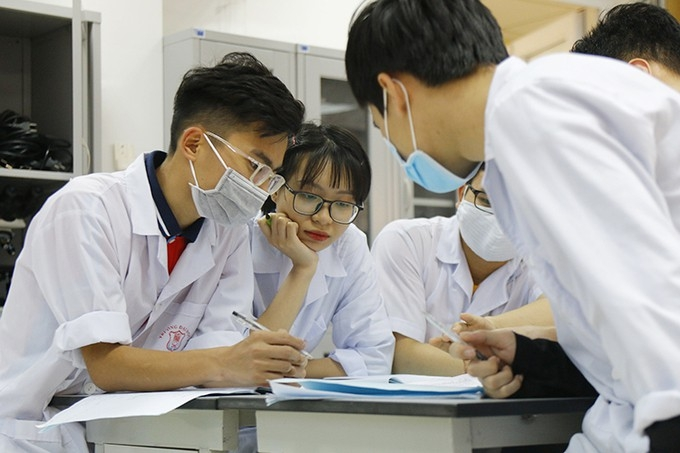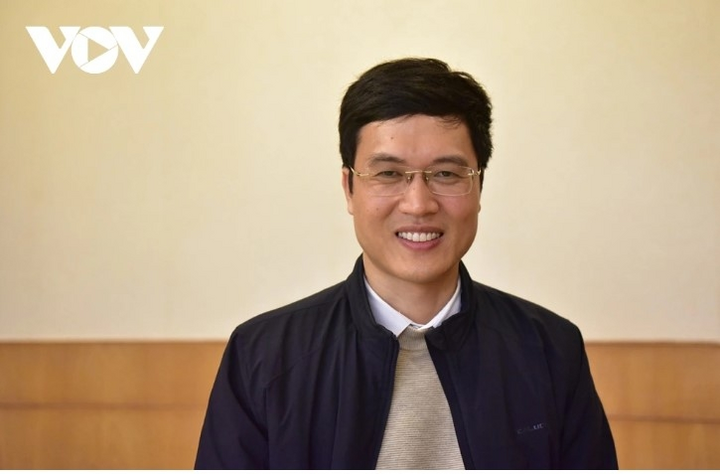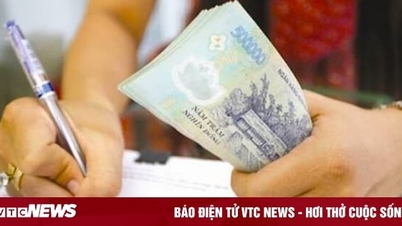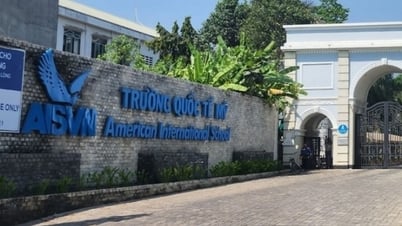Recently, at the National Assembly session on October 4, delegate Nguyen Thi Yen ( Ba Ria - Vung Tau ) raised the issue that doctors and nurses are silent soldiers on the front line of people's health care. However, the allowance regime for night shifts and surgeries has not been changed for more than 10 years.
Therefore, delegates suggested paying attention to adjusting and increasing allowances to encourage and support the medical team.
In addition, the female delegate pointed out that the entrance exam to the medical field is difficult, the study time is long, and the tuition fee is higher than other fields. Therefore, the delegate suggested that the Government consider applying a tuition support policy for medical students similar to the currenteducation sector.

National Assembly delegates proposed to consider exempting tuition fees for medical students like those in education. (Illustration photo, source: KT)
Regarding the tuition fee for medical courses, Nguyen Hai Yen, a fourth-year student of the Faculty of Medicine at Hanoi Medical University, said that her course was lucky to still have the old tuition fee of 28 million VND/year, with only a 10% increase each year. However, the tuition fee has increased in later courses, with the highest fee currently being 55 million VND/year.
Hai Yen believes that with the high tuition fees, the long study time, at least 6 years of university and after graduation still need to continue to study specialties or residency..., on average each medical student will have to spend about 10 years studying to practice. Therefore, many students who do not have enough financial ability will find it difficult to study medicine.
“The schedule of medical students is very tight, in the morning they study clinical at the hospital, in the afternoon they study theory at school, and in the evening they go on duty. Most of us students do not have enough time and health to work outside. Only a very small number of students who are very good at studying can arrange to tutor to earn extra income, the rest need their families to support most of their study and living expenses. To be able to work, the amount of money spent is not small, much higher than other majors,” Yen shared.

Nguyen Hai Yen believes that if there is a tuition support policy like that for students majoring in education, it will reduce the economic burden for medical students. (Photo: NVCC)
The female student said that every year at Hanoi Medical University, there are still scholarship programs, but the conditions to achieve are not easy, and the tuition exemption policies are only for a small number of students who are children of families with preferential policies. Therefore, if there is a tuition support policy like for students majoring in education, it will reduce the economic burden for medical students, so that they can study with peace of mind and dedicate themselves to their profession.
Meanwhile, Hoang Anh Tu, a third-year student at a medical school, said: “I understand that increasing tuition fees for medical schools is natural, as the learning process requires a lot of modern tools and equipment, and is costly. However, not all students have the financial means, so in addition to the pressure of studying because of the heavy knowledge, there is also great pressure from economic issues.”
MSc. Dr. Hoang Van Tam, lecturer at Hanoi Medical University, said that in terms of policy, this is a good thing, helping to reduce pressure on students and attract talents to the medical field. “From the perspective of a student, I fully support this proposal, but in general, this proposal is unrealistic and very difficult to implement. If tuition fees are exempted for medical students, it will put a lot of pressure on the budget, because training a doctor is extremely expensive.”

MSc.BSNT Hoang Van Tam, lecturer at Hanoi Medical University.
According to Dr. Hoang Van Tam, in 6 years of university, students not only study theory but also need to practice a lot, this requires a large training cost. Medical schools find it difficult to reduce tuition fees. At Hanoi Medical University, the highest tuition fee for Medicine is more than 50 million VND/year, however, compared to other countries, this is still quite low.
This lecturer assessed that it is difficult to compare the cost of training in the teaching profession with the medical profession, because the cost of training a doctor is much greater than the cost of training a teacher.
However, Dr. Hoang Van Tam also frankly said that the current tuition fee is also a big barrier for many students who want to pursue a career in medicine. Not only is the cost of university education high, but the post-graduate training process is also very expensive. However, when graduating, the salary that young doctors and nurses receive is not commensurate. For example, resident doctors, when working, are only calculated according to a coefficient of 2.67 and the coefficient for medical graduates is 2.34. Even with other allowances, the income is still low, especially for doctors and nurses at lower levels.
According to the Law on Medical Examination and Treatment 2023, which officially took effect from January 1, 2024, the State will only provide financial support for students majoring in psychiatry, pathology, forensic medicine, forensic psychiatry, infectious diseases and emergency resuscitation. Specifically, students will receive full tuition and living expenses support for the entire course if studying at a training institution in the State health sector; Tuition and living expenses support for the entire course corresponding to the prescribed level if studying at a training institution in the private health sector.
Source: https://vtcnews.vn/de-xuat-mien-hoc-phi-nganh-y-hay-nhung-khong-thuc-te-ar906215.html


![[Photo] Prime Minister Pham Minh Chinh and Prime Minister of the Kingdom of Thailand Paetongtarn Shinawatra attend the Vietnam-Thailand Business Forum 2025](https://vphoto.vietnam.vn/thumb/1200x675/vietnam/resource/IMAGE/2025/5/16/1cdfce54d25c48a68ae6fb9204f2171a)
































![[Photo] President Luong Cuong receives Prime Minister of the Kingdom of Thailand Paetongtarn Shinawatra](https://vphoto.vietnam.vn/thumb/1200x675/vietnam/resource/IMAGE/2025/5/16/52c73b27198a4e12bd6a903d1c218846)




























































Comment (0)